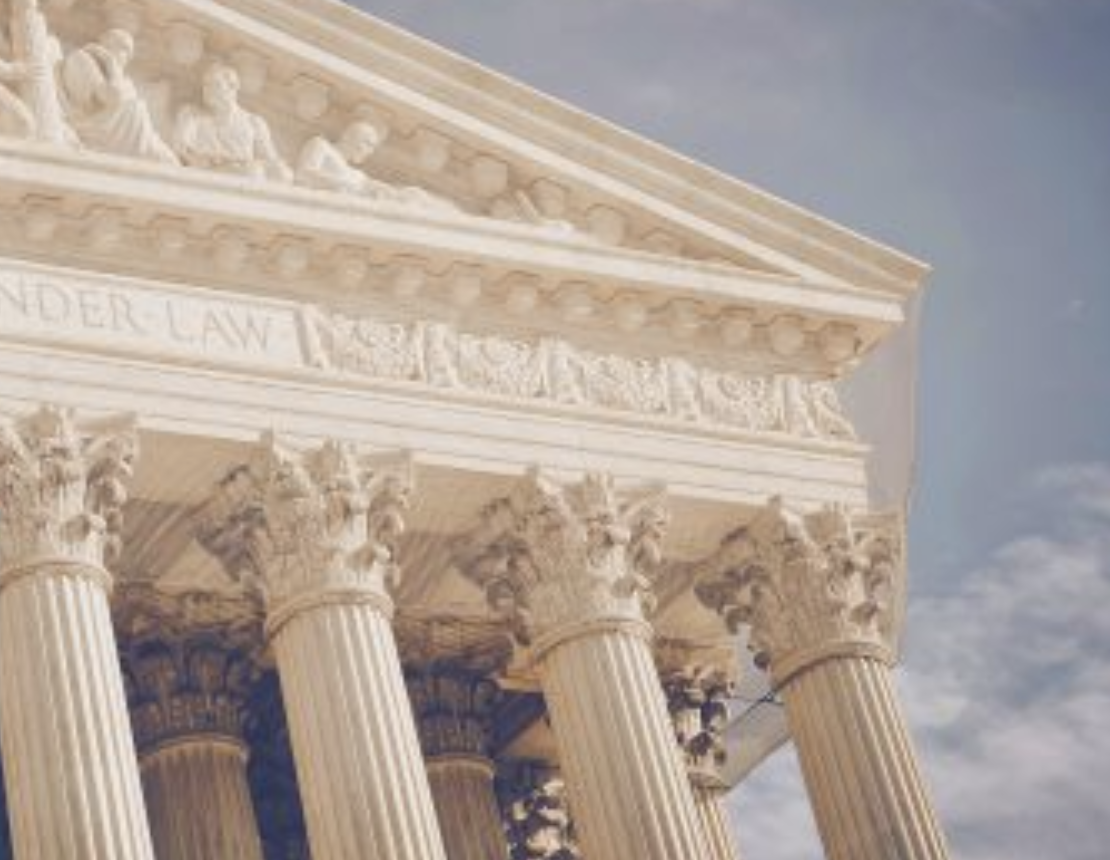Our recent poll shows many Americans concerned about an unbalanced Supreme Court becoming too political and out of step with Americans. The right to an abortion as protected by Roe v. Wade is a crucial consideration in evaluating the next Justice, but it is not the only one; knowing health care protections for people with pre-existing conditions won’t be overturned is also motivating. Further, Americans broadly worry about a politicized Court siding with corporate interests or presiding over the investigation into Trump’s campaign. No matter the subject area, it’s important to remember many Americans are unfamiliar with legal specifics, like the names of Court cases, the impact of a Roe v. Wade reversal, or even the total number of Justices. And concerns about the future of the Court are not limited to conservatives; Democrats find a variety of potential issues before the Supreme Court more important than do Republicans.
Support for abortion rights is necessary, but not sufficient, for the next Justice
Abortion rights, as protected by Roe v. Wade, are important to the public. A majority (57%) say they agree with the decision (only 24% disagree), with a similar number when the decision is further explained (60% agree, only 31% disagree). Almost nine in ten (85%) say it is important they know how the next Justice feels about abortion, with Democrats more likely to say it is “very important” (66%) than are Republicans (58%). When asked to pick four issues from a list of twelve “most important to you, in terms of how the Court decides these cases,” abortion is in the top four. As we’ll see in more detail below, however, other issues beyond abortion are also top-tier.
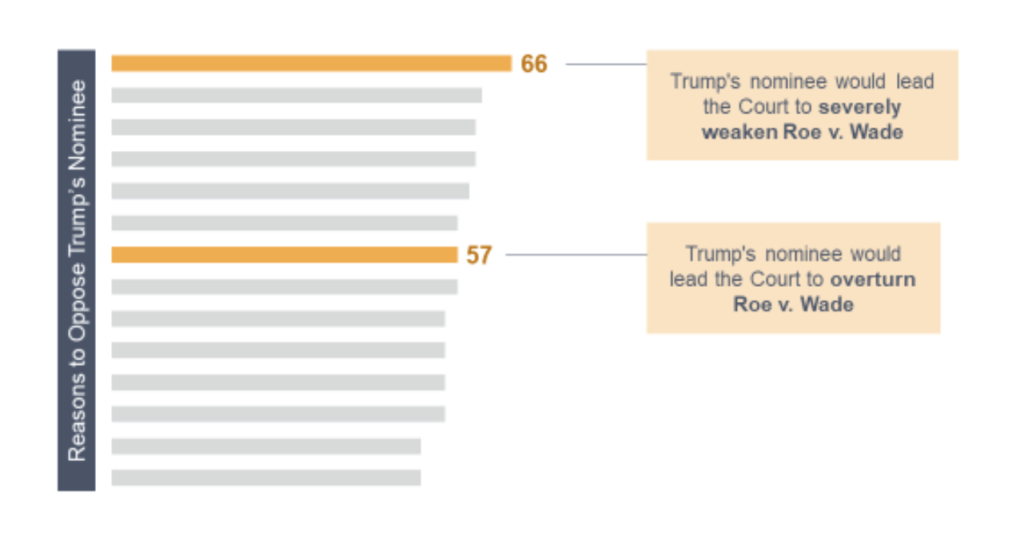
It could be abortion might be a stronger driver of Supreme Court views if more felt abortion rights to be truly in jeopardy. In a series of potential outcomes if Trump’s nominee is confirmed, a third (32%) say they are “very concerned” that “abortion will become illegal in many states,” while only 16% say it is “almost certain” to happen. Similarly, a message about Roe being “severely weakened” is the most compelling reason to oppose Trump’s nominee, and it’s more compelling than an identical message about Roe being “overturned,” particularly with Republicans and independents. For many Americans, especially Democrats and independent women, protecting abortion rights is very important, but despite Vice President Pence’s recent comments about overturning Roe, most don’t yet believe that this one new Justice will be able to fundamentally alter the rules about access.
Many are particularly worried about protections for pre-existing conditions being revoked
Americans believe that the next Justice could fundamentally alter the health care law. A consistent finding here is concern about the Affordable Care Act, and more specifically protections for patients with pre-existing conditions. Rolling back this provision is not just a top concern, it’s a threat Americans view as credible.
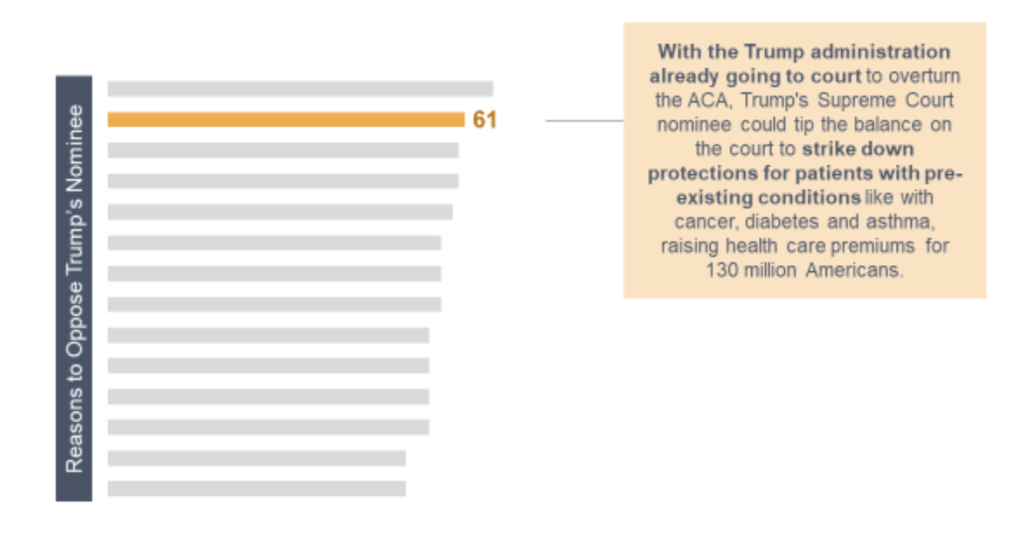
Across party lines, the Affordable Care Act is one of the top issues the Court could decide on when respondents pick four from the list of twelve. Almost all Americans (91%) say it is important they know how the next Justice feels about it. And more Americans — even Democrats — believe it is likely the Affordable Care Act will be overturned “ending protections for people with pre-existing conditions” than believe abortion will become illegal in many states. It is also one of the most concerning potential outcomes among Democrats.
When discussing the Affordable Care Act and pre-existing conditions, it’s essential to provide some context. In a split sample test, simply explaining what overturning the Affordable Care Act might mean is not as compelling of a message to oppose Trump’s nominee as when combined with the introduction “President Trump already joined a lawsuit to overturn the Affordable Care Act. Now he wants to appoint someone to the Supreme Court who could tip the balance on his case.” And while it’s not always the top-testing message with Democrats, it is consistently a top-tier message and top with Republicans.
Americans want a balanced Court, not a political Court
Countless polls — not just this one — have shown Americans worried about our politically divided and polarized climate. That the Court may “become more politically divided” is considered both a likely and concerning potential outcome. And one of the top message frames explains how “it’s important to maintain a balance of ideological opinion. Since retiring Justice Kennedy was often a deciding vote, a new Justice appointed by Trump would make the Court too political and right-wing.”
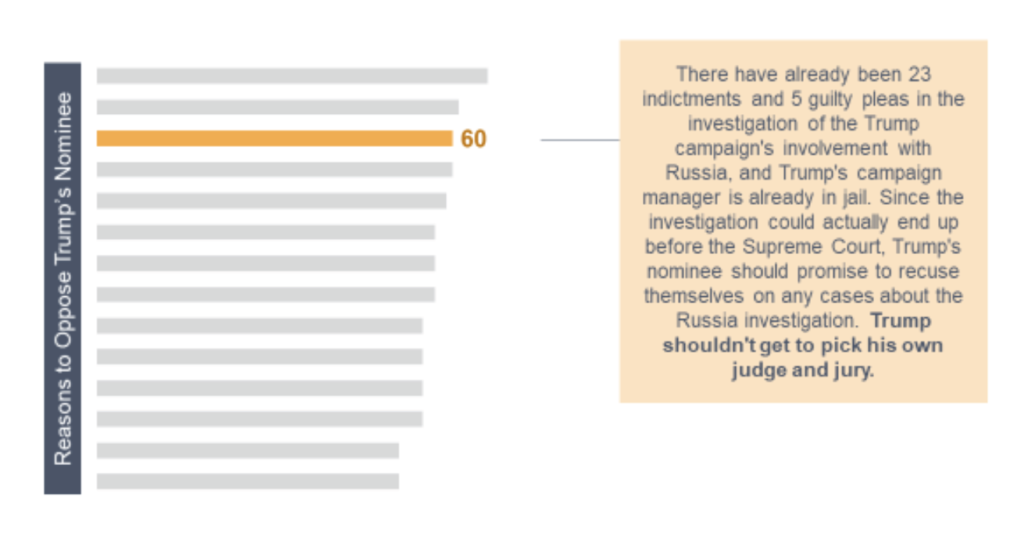
It’s not just the Court’s balance that worries people, but the potential conflict of interest given the likelihood the Court resolves the Trump-Russia investigation. Trump not being “fully held accountable for his abuses of power” is seen as one of the most likely and troubling outcomes. A message built around the investigation’s outcomes so far (23 indictments, 5 guilty pleas, and a campaign manager in jail) is a particularly convincing reason to oppose Trump’s nominee. Additionally, Americans overall, particularly Independents, are responsive to demands that Trump’s Justice recuse themselves from any investigation-related matters appearing before the Court.
Americans fear the Court could give special interests even more political influence
The influence of money and special interests in campaigns does not begin as a top-tier issue. Initially, it falls to the bottom of our list of twelve issues the Court could decide, and a majority can’t rate how they feel about “Citizens United v. Federal Election Commission” unless provided with an explanation of the case. Compared to abortion and the Affordable Care Act, slightly fewer Americans say it’s important for them to know how the next Justice feels about the role of money in campaigns.
Yet, Americans are nonetheless worried about this, especially when given more context. Most are unsure on Citizens United, unexplained (58% don’t know enough about it, 23% agree, 18% disagree), but when described as the case that “allowed corporations, nonprofits, and labor unions to donate unlimited campaign contributions to support specific candidates for office” opposition swelled (19% don’t know enough about it, 23% agree, 58% disagree). That “the wealthy and the powerful will have even more advantages in their ability to influence politics with campaign contributions” is both seen as one of the most likely outcomes of the nomination and one of the most concerning. And a message about “unlimited money” is one of the top messages to oppose Trump’s nominee, in part because it is one of the most compelling with Republicans.
The public requires facts and context
With only half able to correctly identify the number of Supreme Court Justices, don’t assume Americans are familiar with the vernacular of a Supreme Court debate. To recap, our findings suggest the following require more explanation, to either reduce confusion or improve saliency or message impact:
- Citizens United: Unlike with Roe, most Americans have little idea to what this case title refers. When presented with a description, Americans move massively against the ruling.
- The impact of weakening Roe v. Wade: “Weakening” and “overturning” Roe evoke different results. And not everyone believes abortions will become illegal if Trump’s nominee gets confirmed.
- Trump-Russia investigation outcomes: As we’ve seen in previous Navigator polling, it’s crucial we remind Americans about the results of the investigation so far: 23 indictments, 5 guilty pleas, and a campaign manager in jail.
- Trump’s lawsuit to overturn the Affordable Care Act: This recently announced development made an already important motivator even more compelling.
- Justice Kennedy as a deciding vote: Only 49% of Americans know there are nine Supreme Court Justices (with no difference between Democrats and Republicans) and about a third said there were an even number so the notion that this particular Justice will be the deciding vote is not well understood and needs explanation.
Conclusion: Americans want to preserve a balanced Court that protects health care and stays above politics
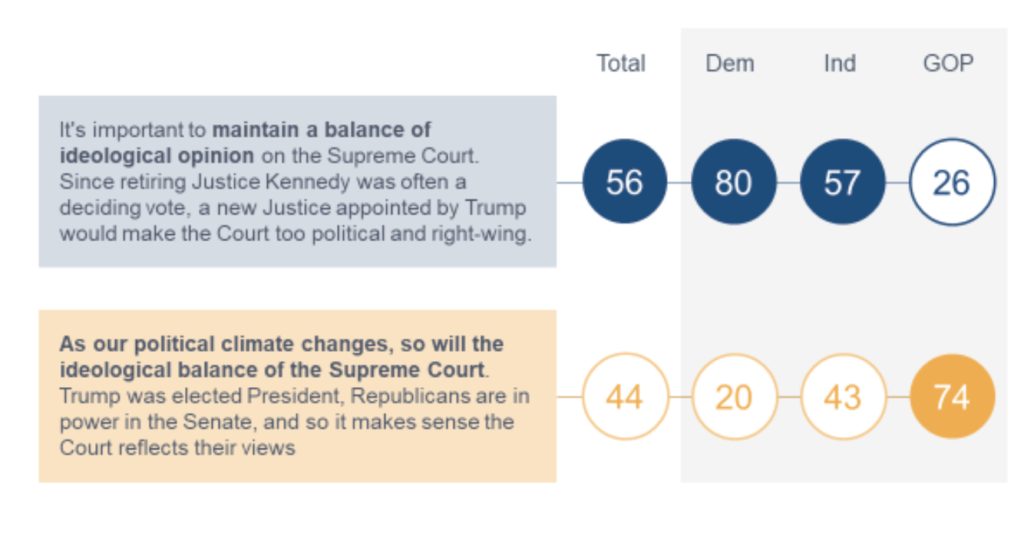
While our current climate is hopelessly divided and overly political, Americans aspire for better for our Supreme Court. Many Americans worry confirming Trump’s nominee will throw the Court out of balance, making it easier for corporations to spend unlimited money on campaigns, weakening Roe v. Wade, and making it harder for people with pre-existing conditions to get the care they need. Additionally, Americans don’t want to see Trump pick his own judge and jury, who might rule on the investigation into Trump’s campaign that has already led to indictments, guilty pleas, and prison.
